Chinese land, US radar and ties to Taiwan: The geopolitics rattling a tiny Pacific nation
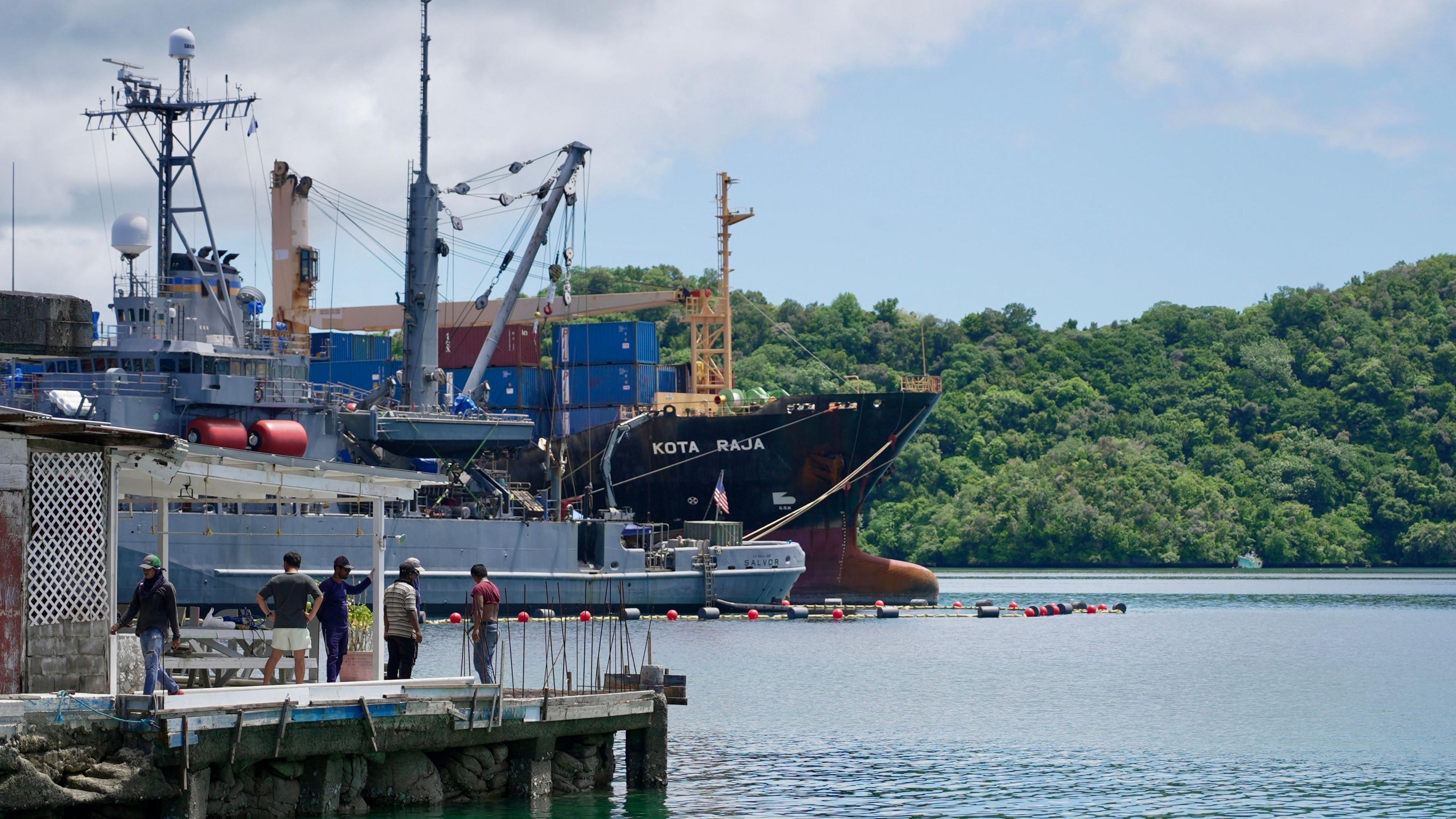
Malakal Harbour, Palau's main port
- Published
The air above Palau's pristine waters smells of salt and breadfruit, and on calm mornings in Koror, Palau's commercial centre, the whirr of dive boat engines echoes across the bay.
A few years ago, those boats were filled with tourists – many from China – drawn to Palau's lagoons and limestone caves. Hotels were full, restaurants bustling, and fishermen could barely keep up with demand. But that is no more.
The boom – and the abrupt collapse – was no accident. Between 2015 and 2017, Chinese tourists made up around half of its visitors. Then, in 2017, Beijing reportedly ordered tour operators to stop selling packages to Palau, slashing the main source of tourism to the islands at the time.
"I actually bought new boats to accommodate the sudden increase of tourists," said a dive shop owner in Koror. But after the tourism peak, he said, these boats had been "sitting idle in the bay" and it took them years just to make back the money they spent.
The message was clear, Palauan officials allege. They say that China had used its vast outbound tourism market as part of a broader campaign to try to peel Palau away from recognising Taiwan - and into Beijing's orbit.
The BBC reached out to China's foreign ministry for comment but has not received a response. China has, however, in the past repeatedly denied using tourism as political leverage.
Palau is one of only a dozen nations that still recognise Taiwan as a sovereign state. This challenges a key pillar of China's foreign policy, the "one China principle", in which Beijing asserts sovereignty over Taiwan.
But it's not just about a diplomatic tug of war.
Palau's location makes it a desirable target for influence from the world's biggest powers. It sits on the so-called "Second Island Chain" – a string of outposts the US sees as crucial to containing China's military expansion and responding to any aggression in the western Pacific.
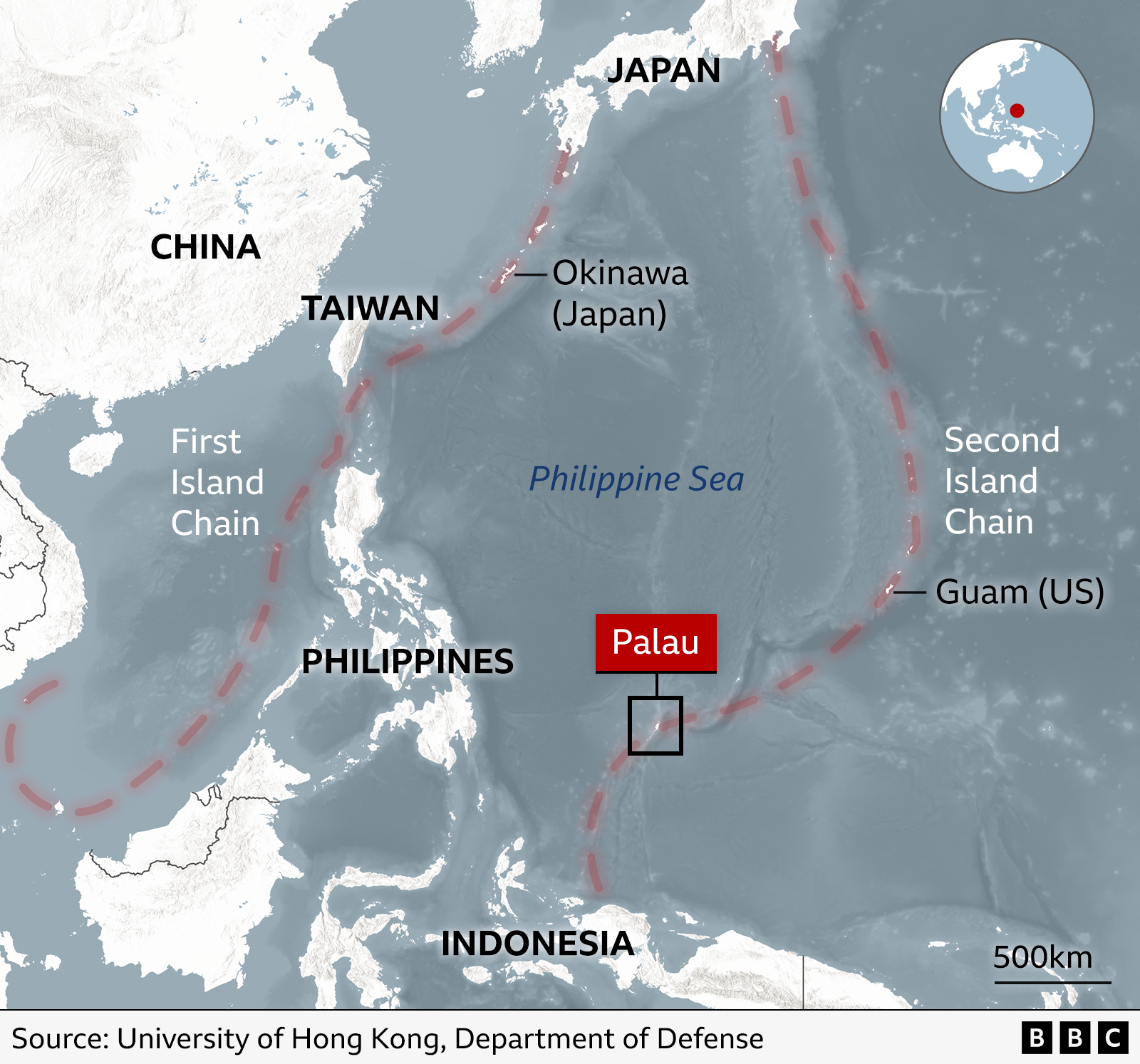
Palau sits on the so-called "Second Island Chain"
Palau and the US have a long history of partnership: before its independence in 1994, Palau was a US-administered territory.
Under an agreement known as the Compact of Free Association, Palau gives the US exclusive military access in exchange for Washington's extensive aid, including Palauan citizens' ability to live and work freely in the US.
Working under the terms of the Compact, the US is now strengthening its own military footprint in the archipelago.
This geopolitical power struggle between China, Taiwan, and the US is cascading down into the daily lives of this tiny nation of fewer than 20,000 people.
"No matter what we do, Palau is going to be the centre of any military activity because of our location," Palau's President, Surangel Whipps Jr. told the BBC.
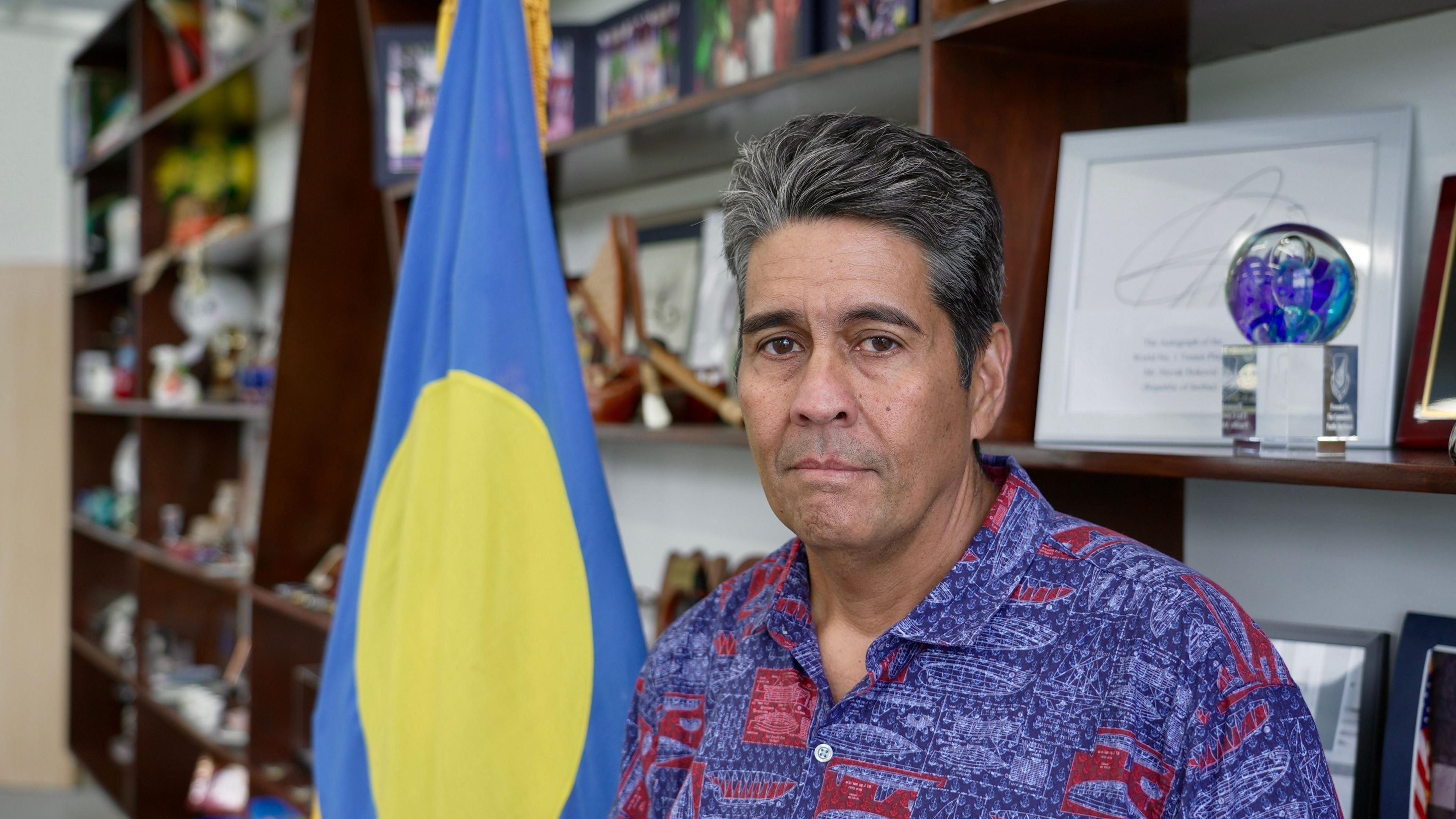
Palau's president, Surangel Whipps Jr.
A prize in the Pacific
Palau's relationship with Taiwan runs deep.
When Palau became independent in 1994, Taiwan moved fast to secure a diplomatic ally, according to Cheng-Cheng Li, an assistant professor at National Dong Hwa University in Hualien, Taiwan, who has conducted extensive research on Taiwan-Palau relations.
Taiwan's assistance to it has been hands-on: agricultural experts working side by side with locals, medical teams in small clinics, funding for local entrepreneurs, and inviting students to Taiwan on scholarships.
For a country with a small population where community-based service plays a central role, Taiwan has been described as a "reliable partner" and a "trusted friend" by many Palauan officials.
Taiwan's ambassador to Palau, Jessica Lee, told the BBC that local leaders had assured her that the relationship was "solid as a rock until death do us part."
Still, Taiwan has reason to worry. In recent years, China has peeled away several of its former allies. In the Pacific region alone, the Solomon Islands, Kiribati, and Nauru have severed their diplomatic ties with it and switched to Beijing since 2019.
Beijing sees the democratically governed island of Taiwan as a breakaway province that will, eventually, be part of the country, and has not ruled out the use of force to achieve this.
Controlling Taiwan is essential to Chinese leader Xi Jinping's goal of reversing what he called China's "century of humiliation" by colonial powers, according to analysts.
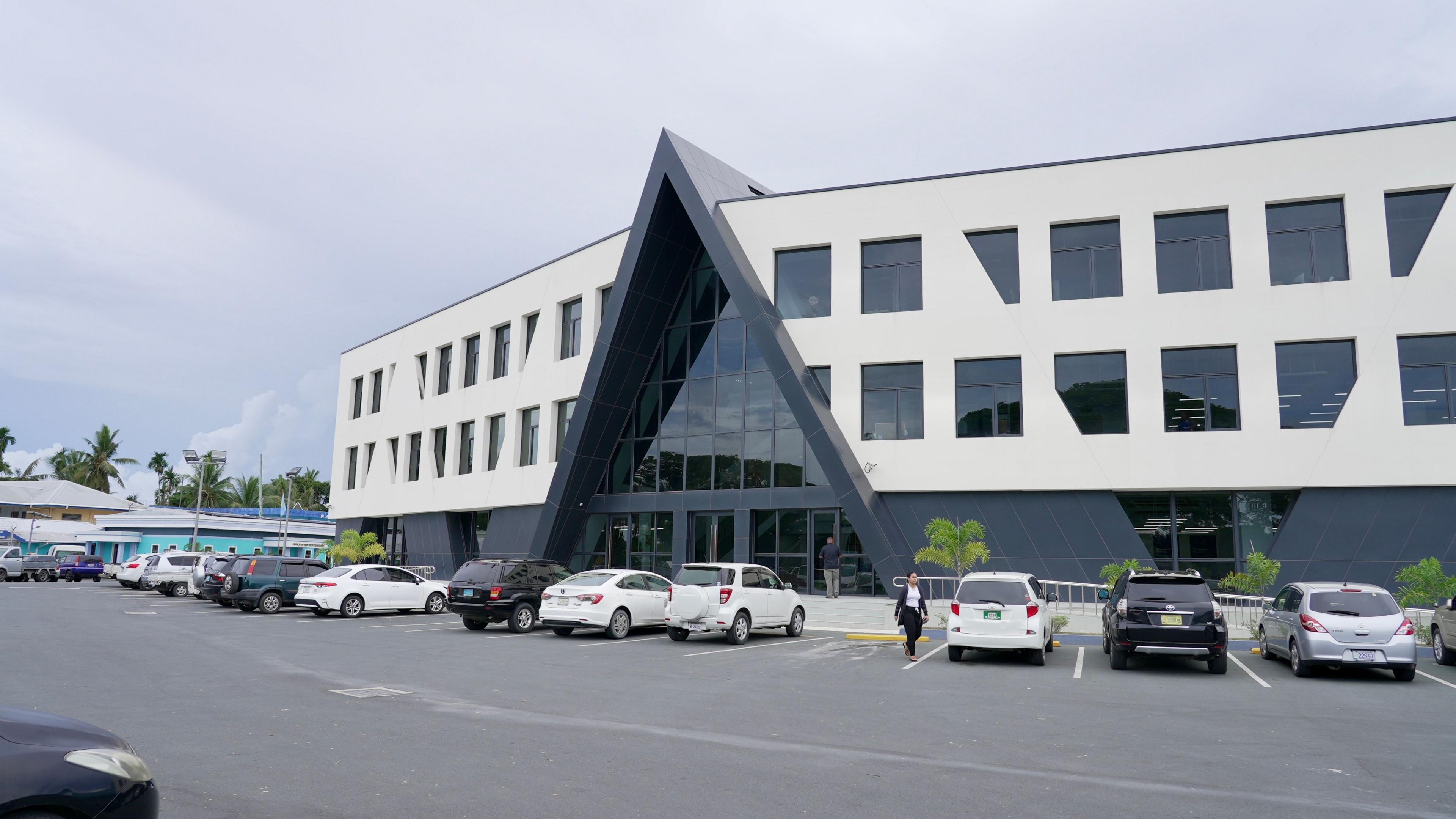
"One Stop Shop," a government building in Palau, donated by Taiwan
"Both the US and Taiwan are paranoid and jumpy about Palau switching," said Graeme Smith, a senior fellow at the Australian National University. "They'll put a lot of resources into making sure it doesn't happen."
Officials in both Palau and Taiwan say Beijing has pulled on a range of levers to influence Palau's diplomatic position.
After he took office in 2021, Palau's president publicly claimed that China offered "a million" tourists in exchange for Palau to this end. He refused.
Then in 2024, China's foreign ministry issued a safety alert, advising Chinese nationals to "exercise caution" when travelling to Palau.
"If China uses tourism as a weapon, then it's an unstable market that we shouldn't depend on," President Whipps Jr. told the BBC. "If China wants a relationship with Palau, they can, but they cannot tell us we cannot have a relationship with Taiwan."
China, however, denies using tourism as a political tool.
In an opinion published last year in the People's Daily, the mouthpiece of the ruling Communist party, the paper stated that China's intention when issuing the alert was to protect its overseas citizens in light of the "increasing public security cases in Palau". It added that the accusations from the president were an attempt to smear China and interfere in its domestic affairs.
When asked in 2017 about the banning of tour groups, China's foreign ministry spokesperson said that he "had not heard about the situation".
But in 2024, responding to Palau's continued recognition of Taiwan, the ministry urged Palau to "make the correct decisions that conform to their own... interests".
Whilst China has not commented on the alleged offer of a million tourists, not everyone agrees with President Whipps Jr.'s assessment. Many locals who spoke with the BBC don't share the president's view on tourism.
"He's very hawkish towards China," said Pai Lee, the Taiwanese owner of a hotel in Koror. "I don't think it's correct to say that China 'weaponised' tourism – they are simply using this as a bargaining chip, just like how people play chess and countries do it all the time."
In any case, the legacy of the sudden tourism swing remains visible.
The economic shock after the suspension of tour groups was sharp, but so was the environmental toll of the sudden influx of tourists itself. Palau, according to environmental protection organisations, was not ready for mass tourism.
"After the end of the explosion of Chinese tourism, I went there and the corals were dead," said Ann Singeo, director of the Ebiil Society, a local NGO.
"You'd see [hundreds of] people in this little cove, all standing on corals. That was the price we paid because we didn't have rules in place to use these resources respectfully."
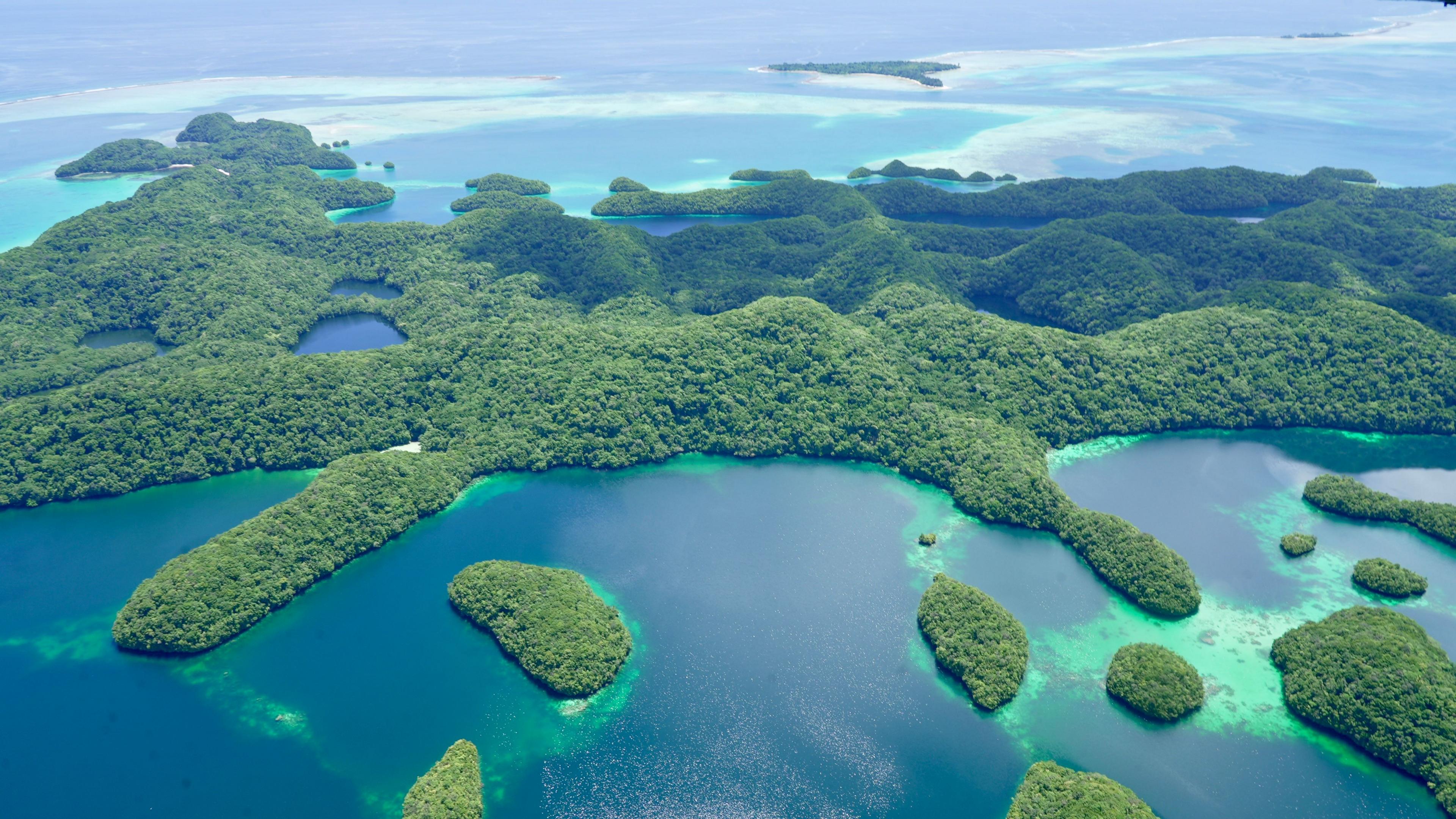
Aerial shot of Rock Islands, Koror, Palau
Tourism is just one part of China's alleged playbook. Beijing has also been trying to strengthen relationships with local leaders: Palauan officials say they have repeatedly been invited to Beijing for visits.
On one such visit, a former Palauan governor said he asked why Taiwan couldn't become independent.
"Taiwan is part of China", replied a Chinese Communist Party official, looking furious.
The US factor
With China's intensifying military activities around Taiwan, including air and sea patrols, the US has claimed that China is readying its military to be capable of invading it.
To contain China's potential aggression towards Taiwan and overall military activities in the western Pacific, the US has ramped up its own military infrastructure buildup in Palau.
Over the years, Washington has been upgrading airstrips, building Tactical Multi-Mission Over-the-horizon Radar system (Tacmor) used to monitor military activities in the Pacific, and planning on expanding Malakal Harbour, Palau's main port, to accommodate larger military vessels.
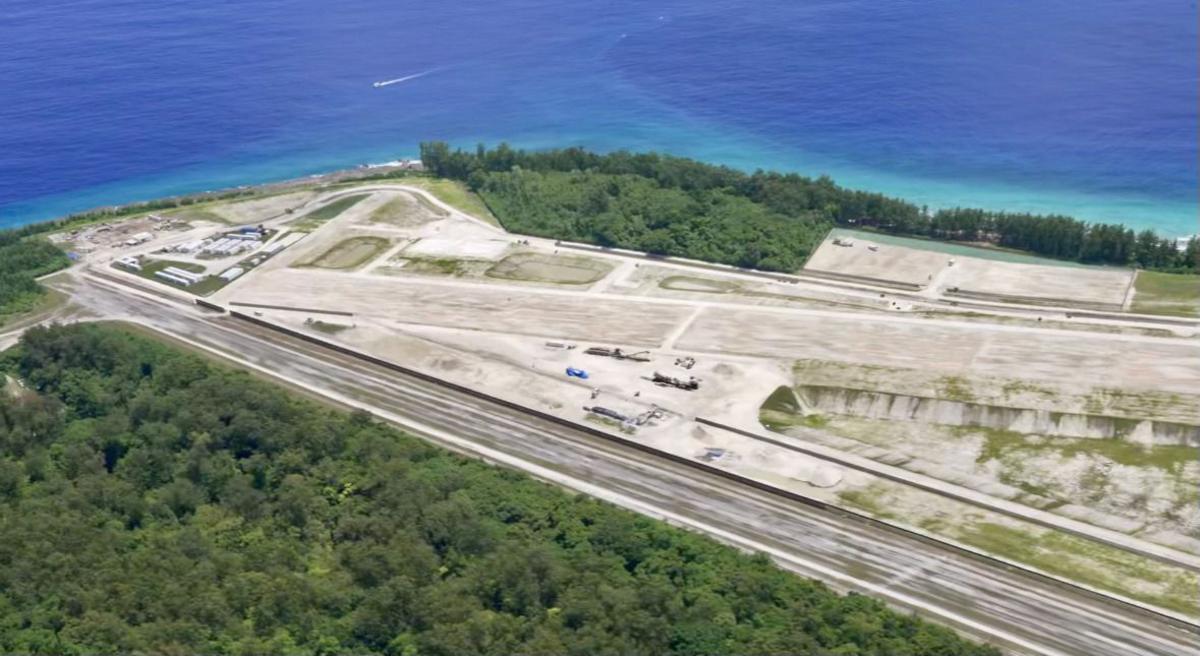
Field cleared for construction for Tacmor receiver site in Angaur, Palau
However, the US has expressed concern over a particular vulnerability: land acquisition.
Documents seen by the BBC show that several Chinese businesses have leased land and developed properties close to these sites, from undeveloped land to hotels overlooking the harbour and Palau's main airport.
In Angaur, a southern state of Palau, for example, the US is now building the receiver site of Tacmor – the plan was announced in 2017. However, in 2019 and 2020, Chinese investors leased land covering over 350,000 square metres following the announcement of radar construction.
One investor, Zhuang Cizhong, proposed building a resort there.
"We went to visit his company in China, and he laid out a plan for a retirement home for rich Chinese," said the former governor of Angaur, Marvin Ngirutang, who believes Palau's government should work more closely with China. "There were booklets of blueprints – it looked legitimate."
The project was never built. Zhuang blamed Covid-19, but Washington remains wary. The US ambassador in Palau could not be reached for comment, but he has previously voiced his concerns.
"All around there are various plots of land now leased to Chinese interests," US ambassador Joel Ehrendreich told Reuters. "I don't think it's any coincidence that it happens to be physically close to our projects."
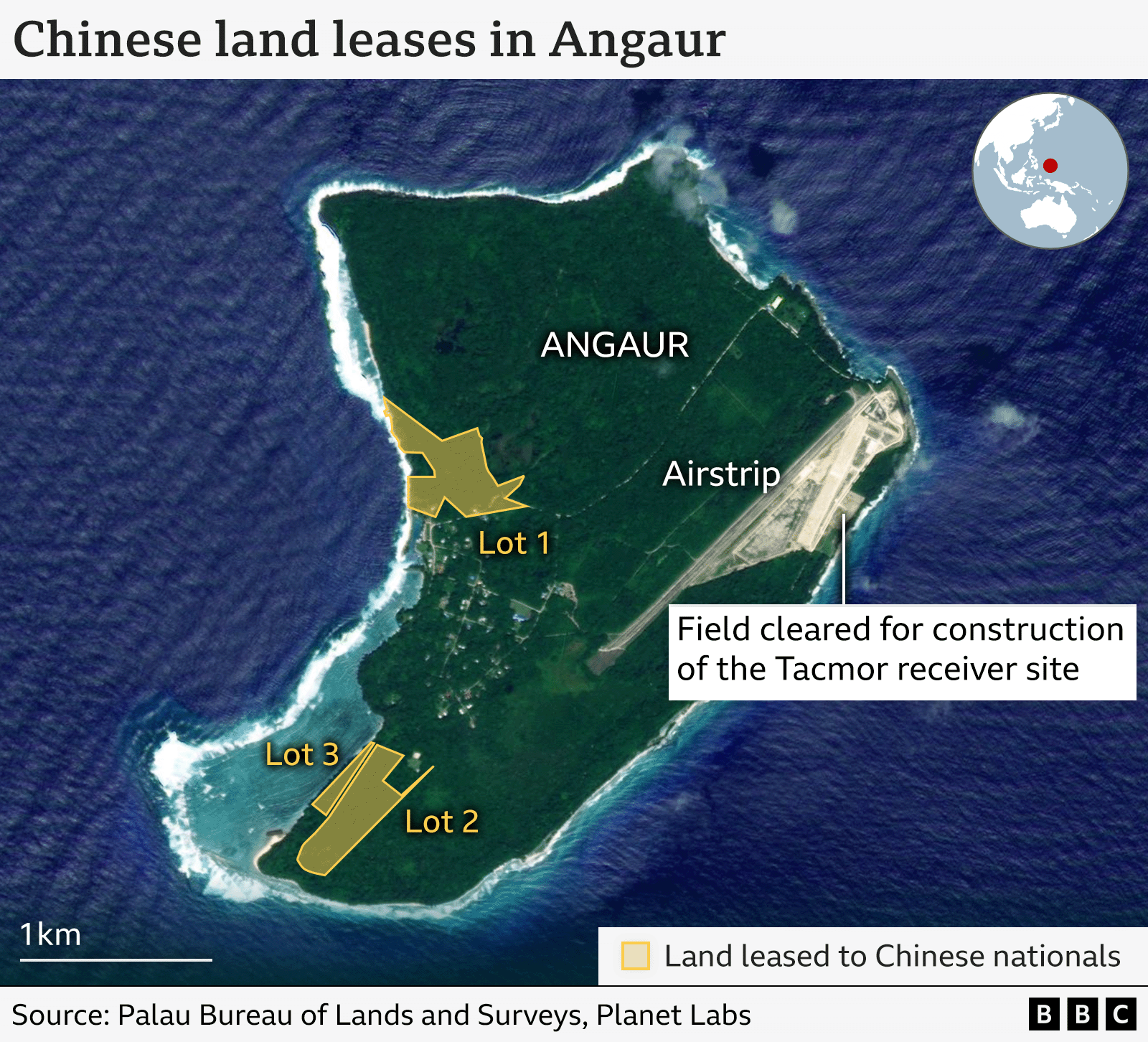
Map illustrating Chinese land leases and US military sites in Angaur, Palau
Such worries are shared locally.
"The concern is that these investments or leases are not legitimate businesses," said Jennifer Anson, Palau's national security advisor. "Maybe on the outside, but when the time comes that China invades Taiwan, these could be transformed into military sites."
Chinese media reports, however, suggest that there were legitimate reasons to push for businesses to invest in Palau. In 2019, Phoenix News, a state-affiliated broadcaster, extolled the virtues of buying property in Palau, citing abundant tourism resources and relaxed legislation.
The BBC is unable to contact Zhuang. China's foreign ministry did not respond to requests for comment on matters related to land leases.
In the shadows of a diplomatic void
Chinese-linked organised crime has also proliferated since 2018, according to authorities in Palau. President Whipps Jr. said that there was a "constant battle going on" as he pointed to crimes linked to China, including scamming, illegal casinos, and cyberattacks.
Some officials claim criminals have exploited the lack of diplomatic ties between China and Palau.
Wan Kuok Koi, known as "Broken Tooth," who led the infamous Macau-based 14k triad, for example, entered Palau as a foreign investor in 2018. The crime syndicate later engaged in bribery, corruption and online gambling in countries including Palau.
Additionally, in 2025, the US Treasury sanctioned several individuals in Palau for their links to the Prince Group, a Chinese-run conglomerate. The group has been accused of scamming, money laundering, industrial-scale human trafficking, among other crimes.
Prince Group did not respond to the BBC's request for comment, but has previously "categorically" denied having engaged in "any unlawful activity," according to the company's statement following the US sanction.
Many of these individuals have been placed on Palau's own "undesirable alien list", and according to Ms. Anson from Palau's national security office, they are banking on China's inability to hunt them down because of the lack of diplomatic relations.
"When you trawl Chinese diaspora sites in Cambodia, where the wisdom of relocating to Palau is sometimes debated, the criminals themselves are drawn by the lack of PRC diplomatic presence there," said ANU's Graeme Smith.
Pawn of powers
For many Palauans, talk of high-level geopolitical struggle feels distant, yet its ripples are everywhere. The US military expansion, Chinese investment, and rumours of hidden agendas feed a growing sense of unease.
"This administration is very hawkish towards China, and I think it's ridiculous," said the former governor of Angaur, who opposes the construction of Tacmor. "We should concentrate on the environment and less on China-US relations".
A petition circulating in recent months asks Washington to spell out its contingency plans in the event of war – a sign of how deep the anxiety runs. It calls on the US to "reassure the people of Palau" that civilians will be protected if conflict was o break out.
"We know what the geopolitics looks like between China and the US," said one resident. "And we are scared our island will be destroyed by a war we don't want to be part of".
Viewers in the UK can see more on Global Eye on Monday 24 November at 7pm on BBC Two and also on iPlayer. Internationally, viewers can see Global Eye on the BBC News Channel this weekend.